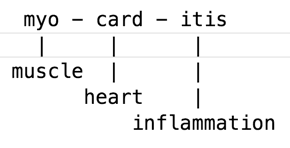Medical Terminology Flashcards
Learn medical terms using our flashcards
Smart-mode flashcards save time
Learning Objectives
This website is intended to supplement classroom and clinical training by providing interactive drills to strengthen long-term retention of medical terms. Our objectives for users:
- Long term retention using spaced repetition
- Understanding of prefixes, suffixes and roots.
- Focused study by area or body system.
Using The Flashcards
Flashcards are an effective and time-tested way of studying. Whether you’re cramming or learning new material gradually, our smart flashcards can really help. And if you choose to create a free account, the system will keep track of your understanding of each term or concept.
After viewing a flashcard, press one of the feedback buttons using these guidelines:
- Again: Your answer was incorrect or blank. You are just beginning to learn this item.
- Hard: You had difficultly answering the question, but you now have some confidence that you know the answer.
- Good: You were able to correctly answer the question after a brief moment.
- Easy: You correctly answered the question immediately.
Smart Flashcards by Body System
General General-II General-IIICardiovascular Cardiovascular-II Cardiovascular-III
Digestive Digestive-II Digestive-III
Directional Directional-II Directional-III
Endocrine Endocrine-II Endocrine-III
Eyes and Ears Eyes and Ears-II Eyes and Ears-III
Interguminary Interguminary-II Interguminary-III
Lymphatic Lymphatic-II Lymphatic-III
Muscular Muscular-II Muscular-III
Nervous Nervous-II Nervous-III
Reproductive Reproductive-II Reproductive-III
Skeletal Skeletal-II Skeletal-III
Urinary Urinary-II Urinary-III
Respiratory Respiratory-II Respiratory-III
Medical Word Parts
Many medical terms consist of two or three word parts with linking vowels. Understanding frequently used word parts can be very helpful in learning medical terms.
Prefixes
Medical terms may begin with a prefix. Prefixes modify for enhance the meaning of the term's root by indicating number, location, time or modifying the root's meaning.
Suffixes
Suffixes can modify the meaning of the word, often in very important ways.
Roots
Medical terms always have at least word root. The root provides the core meaning of the term.
An Example
We can breakdown 'myocarditis' into three parts which will clarify the meaning of this term.

The prefix 'myo' means muscle, followed by the root 'card' which means heart and then the suffix 'itis' means inflammation.
So word parts provide the meaning of myocarditis: inflammation of the heart muscle.
Our Story
We started our medical terminology lessons back in 2002 when we published glossaries for a Prentice Hall (Pearson) workbook and two Littmann (stethoscope) training CDs. In 2015 we added medical terminology flashcards to our EKG and auscultation websites.